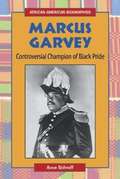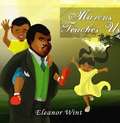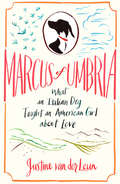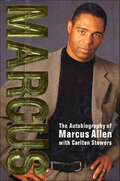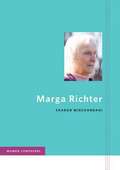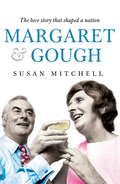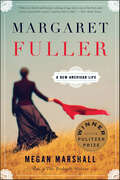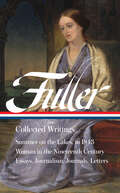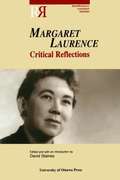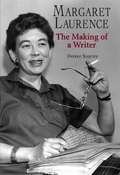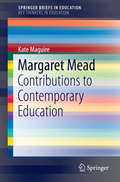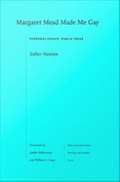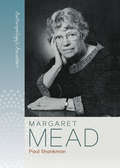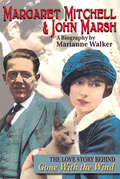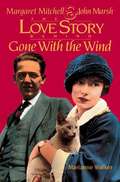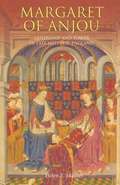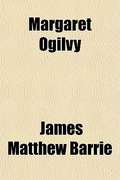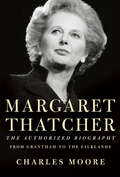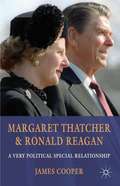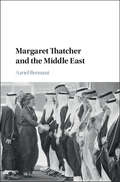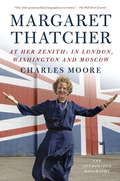- Table View
- List View
Marcus Garvey: Controversial Champion of Black Pride
by Anne SchraffChronicles the life of Marcus Garvey, a fiery black leader who began a crusade for African Americans to fight against oppression in the early years of the twentieth century.
Marcus Teaches Us
by Eleanor Wint<p>Marcus Teaches Us is the first and only book of its kind. It portrays the teachings of The Hon. Marcus Mosiah Garvey in language and pictures that all kids will love. It is bright with innovative colouring activities, uses simple language and gives children the opportunity to practice cursive writing. Marcus Garvey is a monumental, internationally acclaimed Black philosopher who has influenced the independence movement of every black nation in the world. Children worldwide should each have their own copy as they deserve to have the knowledge captured in this attractive book on Marcus Garvey.</p> <P><P><i>Advisory: Bookshare has learned that this book offers only partial accessibility. We have kept it in the collection because it is useful for some of our members. To explore further access options with us, please contact us through the Book Quality link. Benetech is actively working on projects to improve accessibility issues such as these.</i>
Marcus of Umbria: What an Italian Dog Taught an American Girl about Love
by Justine van der LeunReaders will delight in this tale of an urbanite who leaves her magazine job to move to Collelungo, Italy, population: 200. There, in the ancient city center of a historic Umbrian village, she sets up house with the enticing local gardener she met on vacation only weeks earlier. This impulsive decision launches an eye-opening series of misadventures when village life and romance turn out to be radically different from what she had imagined.Love lost with the gardener is found instead with Marcus, an abandoned English pointer that she rescues. With Marcus by her side, Justine discovers the bliss and hardship of living in the countryside: herding sheep, tending to wild horses, picking olives with her adopted Italian family, and trying her best to learn the regional dialect. The result is a rich, comic, and unconventional portrait about learning to live and love in the most unexpected ways.
Marcus: The Autobiography of Marcus Allen
by Carlton Stowers Marcus AllenIn his eloquent words, hear mega-football superstar Marcus Allen--Heisman trophy winner, Super Bowl MVP, and record-breaking running back--tell his inspiring and unforgettable story.In Marcus, learn about his triumphant rise to athletic stardom, to his rocky 11-year relationship with Los Angeles Raiders coach Al Davis, to his controversial friendship with O.J. Simpson, and all the high and low points in between.Marcus on Al Davis:"I could neither understand nor determine why Al Davis had declared war against me. But for all the motives suggested, none involved the possibility that the issue might be racial. Al Davis was many things that I didn't admire, but he was no bigot." Marcus on O.J. Simpson:"I am and forever will be forever be tortured by the loss of two people who were my friends; one murdered, one now forced to live a lifetime being blamed for tragedy." Marcus on Football"It teaches hard lessons about success and failure, joy and disappointment. And when played well, it has a poetry all its own."
Marga Richter
by Sharon MirchandaniThis is the first full-length introduction to the life and works of significant American composer Marga Richter (born 1926), who has written more than one hundred works for orchestra, chamber ensemble, dance, opera, voice, chorus, piano, organ, and harpsichord. Still actively composing in her eighties, Richter is particularly known for her large-scale works performed by ensembles such as the London Philharmonic Orchestra and the Civic Orchestra of Chicago and for other pieces performed by prominent artists including pianist Menahem Pressler, conductor Izler Solomon, and violinist Daniel Heifetz. Interspersing consideration of Richter's musical works with discussion of her life, her musical style, and the origins and performances of her works, Sharon Mirchandani documents a successful composer's professional and private life throughout the twentieth century. Covering Richter's formative years, her influences, and the phases of her career from the 1950s to the present, Mirchandani closely examines Richter's many interesting, attractive musical works that draw inspiration from distinctly American, Irish/English, and Asian sources. Drawing extensively on interviews with the composer, Mirchandani also provides detailed descriptions of Richter's scores and uses reviews and other secondary sources to provide contexts for her work, including their relationship to modern dance, to other musical styles, and to 1970s feminism.
Margaret & Gough: The love story that shaped a nation
by Susan MitchellThe Whitlams' wasn't just a love story - it was a dynamic and enduring partnership that shaped our nation.This is the compelling story of former Prime Minister Gough Whitlam, his wife Margaret and their 70-year relationship ? personal and political, private and public. It is a story of how two extraordinary people, side by side, led the Australian nation into an exciting and turbulent new era.Gough had no small talk, Margaret had the gift of easy conversation. He was often ill-at-ease in company and preferred his books. She was warm, inclusive and jollied him along. He had a vicious tongue and a quick temper. She always tried to see the best in people. He knew everything about the ideology, history and heroes of the Labor movement. She trusted her instincts. They saw each other as equals and never hesitated to express their different viewpoints. He may have passed the laws that changed the nation, but she made it possible.This is a story of love, respect, struggle, success, failure, disappointment and resilience. It was the strength and endurance of this remarkable relationship that helped change our nation politically, culturally and socially. Neither Gough nor Margaret would have developed into what each became without the influence of the other. Through every major political change, every election campaign, every triumph and every loss, they stood together.MARGARET AND GOUGH takes us inside a partnership where the political was always personal and the personal was always political.
Margaret Bourke-White: Young Photographer (Childhood of Famous Americans Series)
by Montrew DunhamA fictionalized biography of the photographer and writer who was one of the original staff photographers for Life magazine and the first accredited woman war correspondent to be sent overseas during World War II.
Margaret Fuller: A New American Life
by Megan MarshallWinner of the Pulitzer Prize for BiographyFrom an early age, Margaret Fuller provoked and dazzled New England’s intellectual elite. Her famous Conversations changed women’s sense of how they could think and live; her editorship of the Transcendentalist literary journal the Dial shaped American Romanticism. Now, Megan Marshall, whose acclaimed The Peabody Sisters “discovered” three fascinating women, has done it again: no biography of Fuller has made her ideas so alive or her life so moving. Marshall tells the story of how Fuller, tired of Boston, accepted Horace Greeley’s offer to be the New-York Tribune’s front-page columnist. The move unleashed a crusading concern for the urban poor and the plight of prostitutes, and a late-in-life hunger for passionate experience. In Italy as a foreign correspondent, Fuller took a secret lover, a young officer in the Roman Guard; she wrote dispatches on the brutal 1849 Siege of Rome; and she gave birth to a son. Yet, when all three died in a shipwreck off Fire Island shortly after Fuller’s fortieth birthday, the sense and passion of her life’s work were eclipsed by tragedy and scandal. Marshall’s inspired account brings an American heroine back to indelible life.
Margaret Fuller: Collected Writings (LOA #388)
by Margaret Fuller&“Humanity can be divided into three classes: men, women, and Margaret Fuller.&”—Edgar Allan PoeA true American original—radical transcendentalist, intrepid journalist, and pioneering feminist—joins Library of America with the most authoritative single-volume collection of her writings ever, including many rare and previously unpublished works, newly transcribed from original notebooks and journalsTranscendentalist, journalist, feminist, activist, public intellectual, war correspondent, poet: Margaret Fuller&’s achievement in her short life was as diverse, wide-ranging, and radical as her multi-generic writings. Now, at long last, this pioneering writer joins Library of America with the most comprehensive and most authoritative version of her writings ever published.Here are her two best-known books: Summer on the Lakes, in 1843, an account of her travels to the Great Lakes, a plea for better treatment of the American Indian peoples, and a sketchbook of Fuller&’s thought; and Woman in the Nineteenth Century, the foundational document of American feminism and the first major work on women&’s rights since Wollstonecraft&’s A Vindication of the Rights of Woman fifty-three years earlier.Joining them are a generous selection of Fuller&’s published essays and journalism, including &“American Literature&” and her reviews and columns for the New York Tribune, as well as her war correspondence from besieged Rome in 1849; unpublished writings and selections from Fuller&’s journals, many previously unknown and newly transcribed for this volume; and a selection of Fuller&’s letters, including three newly translated from the original Italian.Rounding out the volume are a chronology by Fuller&’s biographer Megan Marshall, along with helpful notes identifying Fuller&’s many allusions and quotations, and an index.
Margaret Laurence: Critical Reflections
by David StainesThis book highlights the accomplishments of one of Canada's most acclaimed and beloved fiction writers, Margaret Laurence. The essays in this collection explore her body of work as well as her influence on young Canadian writers today.
Margaret Laurence: The Making of a Writer
by Donez XiquesMargaret Laurence: The Making of a Writer is an engaging narrative that contains new and important findings about Laurence’s life and career. This biography reveals the challenges, successes, and failures of the long apprenticeship that preceded the publication of the The Stone Angel, Laurence’s first commercially successful novel. Donez Xiques demonstrates the importance of Margaret Laurence’s early work as a journalist in her development as a writer and covers her return to Canada from Africa in the late 1950s. She details the significance of Laurence’s "Vancouver years" as well as the challenges of her year in London prior to settling at Elm Cottage in Buckinghamshire, when Laurence stood on the verge of success. The Margaret Laurence known to most people is a public figure of the 1960s and 1970s; matriarchal, matronly, and accomplished. The story of her early years in the harsh setting of the Canadian Prairies during the 1930s - years of drought and the Great Depression - and of her African years has never before been chronicled with the thoroughness and vividness that Xiques provides for the reader. Appended to this powerful new biography is a short story by Margaret Laurence that has never before been published and two other stories that have not been widely available. They indicate the range of her concerns and show a marked departure from her fiction in The Tomorrow-Tamer and Other Stories and A Bird in the House. Readers will benefit from the extensive research in this full and vibrant portrait of one of the most revered writers of twentieth-century Canadian literature.
Margaret Mead
by Kate MaguireThis book makes a case for Margaret Mead's contributions to education discourses, which in retrospect appear visionary and profoundly democratic, non judgemental and transdisciplinary, and for their relevance for education today at primary, secondary and tertiary levels. Mead combined her substantial skills and knowledge as a linguist, anthropologist and psychologist to draw attention to the primary role of culture and society in identity formation, privileging against sterner perspectives, the idea that the conditions that support the emergence of balanced personalities, able to contribute to society and to progress themselves as individuals, starts with observation of self before that of others. This observation of and reflection on self was for her a necessary demonstration of transparency while close observation of others was 'an act of love', much as the artist contemplates his/her subject, that dissolved negative differences of culture, belief and status.
Margaret Mead Made Me Gay: Personal Essays, Public Ideas
by Esther NewtonMargaret Mead Made Me Gay is the intellectual autobiography of cultural anthropologist Esther Newton, a pioneer in gay and lesbian studies. Chronicling the development of her ideas from the excitement of early feminism in the 1960s to friendly critiques of queer theory in the 1990s, this collection covers a range of topics such as why we need more precise sexual vocabularies, why there have been fewer women doing drag than men, and how academia can make itself more hospitable to queers. It brings together such classics as "The Mythic Mannish Lesbian" and "Dick(less) Tracy and the Homecoming Queen" with entirely new work such as "Theater: Gay Anti-Church. " Newton's provocative essays detail a queer academic career while offering a behind-the-scenes view of academic homophobia. In four sections that correspond to major periods and interests in her life--"Drag and Camp," "Lesbian-Feminism," "Butch," and "Queer Anthropology"--the volume reflects her successful struggle to create a body of work that uses cultural anthropology to better understand gender oppression, early feminism, theatricality and performance, and the sexual and erotic dimensions of fieldwork. Combining personal, theoretical, and ethnographic perspectives, Margaret Mead Made Me Gay also includes photographs from Newton's personal and professional life. With wise and revealing discussions of the complex relations between experience and philosophy, the personal and the political, and identities and practices, Margaret Mead Made Me Gay is important for anyone interested in the birth and growth of gay and lesbian studies.
Margaret Mead: A Life
by Jane HowardComprehensive biography of the pioneering cultural anthropologist.
Margaret Mead: Anatomy Of An Anthropological Controversy (Anthropology's Ancestors #1)
by Paul ShankmanTracing Mead’s career as an ethnographer, as the early voice of public anthropology, and as a public figure, this elegantly written biography links the professional and personal sides of her career. The book looks at Mead’s early career through the end of World War II, when she produced her most important anthropological works, as well as her role as a public figure in the post-war period, through the 1960s until her death in 1978. The criticisms of Mead are also discussed and analyzed. This short volume is an ideal starting point for anyone wanting to learn about, arguably, the most famous anthropologist of the twentieth century.
Margaret Mitchell & John Marsh: The Love Story Behind Gone With the Wind
by Marianne WalkerBased on almost 200 previously unpublished letters and extensive interviews with their closest associates, Walker's biography of Margaret Mitchell and her husband, John Marsh, offers a new look into a devoted marriage and fascinating partnership that ultimately created a Pulitzer Prize–winning novel. This edition of Walker's biography celebrates the seventy-fifth anniversary of the publication of Gone With the Wind in 1936.In lively extracts from their letters to family and friends, John and Margaret, who also went by Peggy, describe the stormy years of their courtship, their bohemian lifestyle as a young married couple, the arduous but fulfilling years when Peggy was writing her famous novel, the thrill of its acceptance for publication and its literary success, and the excitement of the making of the movie. In telling the private side of this twenty-four-year marriage, author Marianne Walker reveals a long-suspected truth: Gone With the Wind might have never been written were it not for John Marsh. He was Peggy's best friend and constant champion, and he became her editor, proofreader, researcher, business manager, and the inspiration and motivation behind her writing. At every point, including the turbulent years of Mitchell's first marriage to Red Upshaw, it was John who provided the intellectual stimulation, emotional support, and editorial insights that allowed Peggy to channel her talents into the creation of her astounding Civil War epic. From years of meticulous research, Marianne Walker details the intimate and moving love story between a husband and wife, and between a writer and her editor.
Margaret Mitchell and John Marsh: The Love Story Behind Gone With the Wind
by Marianne WalkerBased on almost 200 previously unpublished letters and extensive interviews with their closest associates, Walker's biography of Margaret Mitchell and her husband, John Marsh, offers a new look into a devoted marriage and fascinating partnership that ultimately created a Pulitzer Prize winning novel. This edition of Walker's biography celebrates the seventy-fifth anniversary of the publication of Gone With the Wind in 1936. In lively extracts from their letters to family and friends, John and Margaret, who also went by Peggy, describe the stormy years of their courtship, their bohemian lifestyle as a young married couple, the arduous but fulfilling years when Peggy was writing her famous novel, the thrill of its acceptance for publication and its literary success, and the excitement of the making of the movie. In telling the private side of this twenty-four-year marriage, author Marianne Walker reveals a long-suspected truth: Gone With the Wind might have never been written were it not for John Marsh. He was Peggy's best friend and constant champion, and he became her editor, proofreader, researcher, business manager, and the inspiration and motivation behind her writing. At every point, including the turbulent years of Mitchell's first marriage to Red Upshaw, it was John who provided the intellectual stimulation, emotional support, and editorial insights that allowed Peggy to channel her talents into the creation of her astounding Civil War epic. Through years of meticulous research, Marianne Walker reveals the intimate and moving love story between a husband and wife, and between a writer and her editor.
Margaret Of Anjou: Queenship and Power in Late Medieval England
by Helen E. MaurerMargaret of Anjou was a vengeful and violent woman, or so we have been told, whose vindictive spirit fuelled the fifteenth-century dynastic conflict, the Wars of the Roses. In Shakespeare's rendering she becomes an adulterous queen who mocks her captive enemy, Richard, duke of York, before killing him in cold blood. Shakespeare's portrayal has proved to be remarkably resilient, because Margaret's queenship lends itself to such an assessment. In 1445, at the age of fifteen, she was married to the ineffectual Henry VI, a move expected to ensure peace with France and an heir to the throne. Eight years later, while she was in the later stages of her only pregnancy, Henry suffered a complete mental collapse that left him catatonic for roughly a year and a half: Margaret came to the political forefront. In the aftermath of the king's illness, she became an indefatigable leader of the Lancastrian loyalists in their struggle against their Yorkist opponents. Margaret's exercise of power was always fraught with difficulty: as a woman, her effective power was dependent upon her invocation of the authority of her husband or her son. Her enemies lost no opportunity to charge her with misconduct of all kinds. More than five hundred years after Margaret's death this examination of her life and career allows a more balanced and detached view.
Margaret Ogilvy
by J. M. BarriePurchase of this book includes free trial access to www. million-books. com where you can read more than a million books for free. This is an OCR edition with typos. Excerpt from book: CHAPTER III WHAT I SHOULD BE My mother was a great reader, and with ten minutes to spare before the starch was ready would begin the ' Decline and Fall' ? and finish it, too, that winter. Foreign words in the text annoyed her and made her bemoan her want of a classical education ? she had only attended a Dame's school during some easy months ? but she never passed the foreign words by until their meaning was explained to her, and when next she and they met it was as acquaintances, which I think was clever of her. One of her delights was to learn from me scraps of Horace, and then bring them into her conversation with c colleged men. ' I have come upon her in lonely places, such as the stair-head or the east room, muttering these quotations aloud to herself, and I well remember how she would say to the visitors, ' Ay, ay, it's very true, Doctor, but as you know, Eheu fugaces, Postume, Postume, labuntur anni, ' or ' Sal, Mr. so and so, my lassie is thriving well, but would it no be more to the point to say O mater, pulchra filia pulchrior ' which astounded them very much if she managed to reach the end without being flung, but usually she had a fit of laughing in the middle, and so they found her out. Biography and exploration were her favourite reading, for choice the biography of men who had been good to their mothers, and she liked the explorers to be alive so that she could shudder at the thought of their venturing forth again, but though she expressed a hope that they would have the sense to stay at home henceforth, she gleamed with admiration when they disappointed her. In later days I had a friend who was an African explorer, and she was in two minds about him; he was one of the most engrossing of mortals to her, she admired him prodigiously, pictur. . .
Margaret Paston’s Piety
by Joel T. RosenthalThe collection of Margaret Paston's letters and papers from fifteenth century England offeran invaluableexampleof daily life during that period. Drawing on a close reading of these personal letters, as well as Paston'swill, this book reveals how popular religion was integrated into daily life. "
Margaret Thatcher
by Charles MooreWith unequaled authority and dramatic detail, the first volume of Charles Moore's authorized biography of Margaret Thatcher reveals as never before the early life, rise to power, and first years as prime minister of the woman who transformed Britain and the world in the late twentieth century. Moore has had unique access to all of Thatcher's private and governmental papers, and interviewed her and her family extensively for this book. Many of her former colleagues and intimates have also shared previously unseen papers, diaries, and letters, and spoken frankly to him, knowing that what they revealed would not be published until after her death. The book immediately supersedes all other biographies and sheds much new light on the whole spectrum of British political life from Thatcher's entry into Parliament in 1959 to what was arguably the zenith of her power--victory in the Falklands in 1982. Drawing on an extraordinary cache of letters to her sister Muriel, Moore illuminates Thatcher's youth, her relationship with her parents, and her early romantic attachments, including her first encounters with Denis Thatcher and their courtship and marriage. Moore brilliantly depicts her determination and boldness from the very beginning of her political career and gives the fullest account of her wresting the Tory leadership from former prime minister Edward Heath at a moment when no senior figure in the party dared to challenge him. His account of Thatcher's dramatic relationship with Ronald Reagan is riveting. This book also explores in compelling detail the obstacles and indignities that Thatcher encountered as a woman in what was still overwhelmingly a man's world. Moore's admiration for Thatcher is evident, yet his portrait is convincingly clear-eyed, conveying both how remarkable she was and how infuriating she could be, her extraordinary grasp at mastering policy and what needed to be done, and her surprising vulnerabilities. At the moment when Margaret Thatcher becomes a part of history, Moore's portrait enlivens her, compellingly re-creating the circumstances and experiences that shaped one of the most significant world leaders of the postwar era.
Margaret Thatcher and Ronald Reagan
by James CooperA new exploration of the relationship between the Margaret Thatcher and Ronald Reagan administrations in domestic policy. Using recently released documentary material and extensive research interviews, James Cooper demonstrates how specific policy transfer between these 'political soul mates' was more limited than is typically assumed.
Margaret Thatcher and the Middle East
by Azriel BermantMargaret Thatcher and the Middle East examines Thatcher's policy on the Middle East, with a spotlight on her approach towards the Israeli-Palestinian conflict. It questions claims that she sought to counter the Foreign Office Middle East policy, and maintains that the prime minister was actually in close agreement with the Whitehall bureaucracy on the Arab-Israeli conflict. In particular, the volume argues that Thatcher's concerns over Soviet ambitions in the Middle East encouraged her to oppose the policies of Israel's Likud governments, and to work actively for an urgent resolution of the conflict. Furthermore, while Thatcher was strongly pro-American, this was not translated into automatic support for Israel. Indeed, the Thatcher government was very much at odds with the Reagan administration over the Middle East, as a result of Washington's neglect of the forces of moderation in the region.
Margaret Thatcher: From Grantham to the Falklands
by Charles MooreWith unequaled authority and dramatic detail, the first volume of Charles Moore's authorized biography of Margaret Thatcher reveals as never before the early life, rise to power, and first years as prime minister of the woman who transformed Britain and the world in the late twentieth century. Moore has had unique access to all of Thatcher's private and governmental papers, and interviewed her and her family extensively for this book. Many of her former colleagues and intimates have also shared previously unseen papers, diaries, and letters, and spoken frankly to him, knowing that what they revealed would not be published until after her death. The book immediately supersedes all other biographies and sheds much new light on the whole spectrum of British political life from Thatcher's entry into Parliament in 1959 to what was arguably the zenith of her power--victory in the Falklands in 1982. Drawing on an extraordinary cache of letters to her sister Muriel, Moore illuminates Thatcher's youth, her relationship with her parents, and her early romantic attachments, including her first encounters with Denis Thatcher and their courtship and marriage. Moore brilliantly depicts her determination and boldness from the very beginning of her political career and gives the fullest account of her wresting the Tory leadership from former prime minister Edward Heath at a moment when no senior figure in the party dared to challenge him. His account of Thatcher's dramatic relationship with Ronald Reagan is riveting. This book also explores in compelling detail the obstacles and indignities that Thatcher encountered as a woman in what was still overwhelmingly a man's world. Moore's admiration for Thatcher is evident, yet his portrait is convincingly clear-eyed, conveying both how remarkable she was and how infuriating she could be, her extraordinary grasp at mastering policy and what needed to be done, and her surprising vulnerabilities. At the moment when Margaret Thatcher becomes a part of history, Moore's portrait enlivens her, compellingly re-creating the circumstances and experiences that shaped one of the most significant world leaders of the postwar era.
Margaret Thatcher: In London, Washington and Moscow (Authorized Biography of Margaret Thatcher)
by Charles MooreIn June 1983 Margaret Thatcher won the biggest increase in a government's parliamentary majority in British electoral history. Over the next four years, as Charles Moore relates in this central volume of his uniquely authoritative biography, Britain's first woman prime minister changed the course of her country's history and that of the world, often by sheer force of will. The book reveals as never before how Mrs. Thatcher transformed relations with Europe, privatized the commanding heights of British industry and continued the reinvigoration of the British economy. It describes her role on the world stage with dramatic immediacy, identifying Mikhail Gorbachev as "a man to do business with" before he became leader of the Soviet Union, and then persistently pushing him and Ronald Reagan, her great ideological soul mate, to order world affairs according to her vision. For the only time since Churchill, she ensured that Britain had a central place in dealings between the superpowers. But even at her zenith she was beset by difficulties. Reagan would deceive her during the U.S. invasion of Grenada. She lost the minister to whom she was personally closest to scandal and faced calls for her resignation. She found herself isolated within her own government. She was at odds with the Queen over the Commonwealth and South Africa. She bullied senior colleagues and she set in motion the poll tax. Both these last would later return to wound her, fatally. Charles Moore has had unprecedented access to all of Mrs. Thatcher's private and government papers. The participants in the events described have been so frank in interviews that we feel we are eavesdropping on their conversations as they pass. We look over Mrs. Thatcher's shoulder as she vigorously annotates documents and as she articulates her views in detail, and we understand for the first time how closely she relied on a handful of trusted advisers to carry out her will. We see her as a public performer, an often anxious mother, a workaholic and the first woman in Western democratic history who truly came to dominate her country in her time. In the early hours of October 12, 1984, during the Conservative party conference in Brighton, the IRA attempted to assassinate her. She carried on within hours to give her leader's speech at the conference. One of her many left-wing critics, watching her that day, said, "I don't approve of her as Prime Minister, but by God she's a great tank commander." This titanic figure, with all her capabilities and her flaws, storms from these pages as from no other book.From the Hardcover edition.
